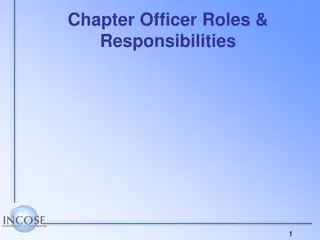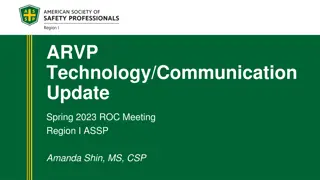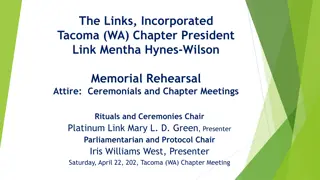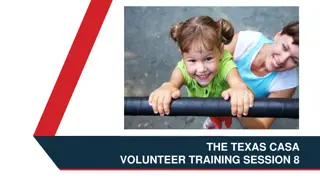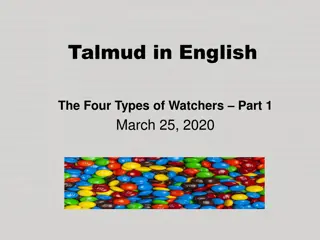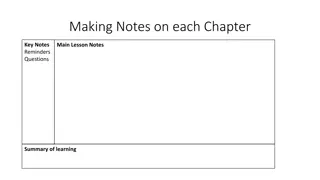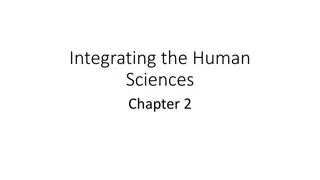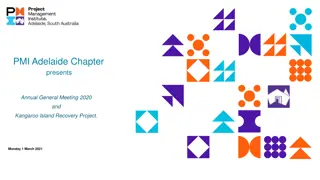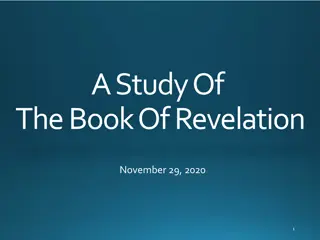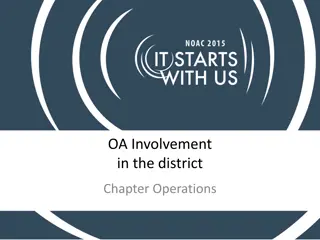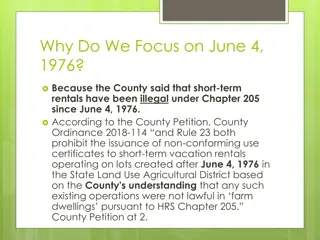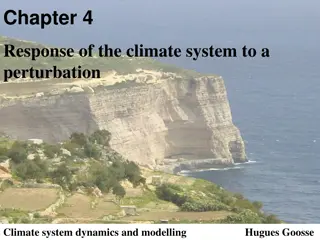Insights from Mishnah Berakhot Chapter 4
Explore the teachings from Mishnah Berakhot Chapter 4 presented by Rabbi Ellen S. Wolintz-Fields, focusing on prayer timings, rituals, and gratitude practices. Reflect on time-bound rituals, structured daily routines, and the significance of prayers in different contexts. Dive into the wisdom of Rabbi Nechunya ben HaKanah's prayers upon entering and leaving the study hall, and contemplate the essence of gratitude rituals. Delve into the discussions on the number of blessings in Shemoneh Esrei and the fluency of prayers according to Rabban Gamliel, Rabbi Yehoshua, and Rabbi Akiva.
Download Presentation

Please find below an Image/Link to download the presentation.
The content on the website is provided AS IS for your information and personal use only. It may not be sold, licensed, or shared on other websites without obtaining consent from the author. Download presentation by click this link. If you encounter any issues during the download, it is possible that the publisher has removed the file from their server.
E N D
Presentation Transcript
Mishnah Berakhot, Chapter 4 - Livin on a Prayer Rabbi Ellen S. Wolintz-Fields, Executive Director, Women s League for Conservative Judaism, Zoom - Thursday, November 21, 2019, 8 pm EST 1
1. Chapter 4: Mishnah 1 - Time restrictions on when prayers can be recited. 2
: , , . . , . . . . , Shacharit [can be said] until midday. Rabbi Yehudah says until four hours into the day. Minchah [can be said] until the evening. Rabbi Yehudah says until the middle of the afternoon. Ma'ariv has no set time and Musaf can be said all day. Rabbi Yehudah says until seven hours into the day. 3
Questions to ponder to make this relevant - Do you have time bound rituals in your own life? Does your day have a specific structure? How would you describe the way your life is structured during the day? 4
2. Chapter 4: Mishnah 2 - Prayers entering and leaving study hall. 5
. , , , . : Rabbi Nechunya ben HaKanah would offer a brief prayer when he entered the study hall and when he left. They said to him: What is the nature of this prayer? He told them: Upon my entrance, I pray that no mishaps should occur because of me; and upon my departure, I offer thanksgiving for my portion. 6
Questions to ponder to make this relevant - Do you have specific gratitude mantra, or gratitude rituals ? (not the usual, Thank you, etc. Something else.) Have you ever thought of creating a gratitude ritual? Perhaps a Gratitude Journal? Isn t it great we are studying this the week before Thanksgiving - you can bring this mishnah to your Thanksgiving Day celebration. 7
3. Chapter 4: Mishnah 3 - Shemoneh Esrei - Number of blessings; Fluency. 8
. . , . , , , : , Rabban Gamliel says: Every day a person must pray eighteen [blessings of Shemoneh Esrei]. Rabbi Yehoshua says: [One may say] an abbreviated [form of the] eighteen [blessings]. Rabbi Akiva says: If his/her prayer is fluent in his/her mouth, s/he must say eighteen; and if it is not -- an abbreviated eighteen. 9
Weekday, Shacharit, Amidah, Against Enemies , , , . ', : . . . And for slanderers may there be no hope; and may all wickedness be destroyed instantly and may all Your enemies be cut down quickly. Quickly uproot, smash, and cast down the arrogant sinners and humble them quickly in our days. Blessed are You, O Lord, Who breaks enemies and humbles arrogant sinners. 10
Questions to ponder to make this relevant - Do you feel rushed to finish? Do you say your own prayers Combine what is taught in Mishnah 3 and in Mishnah 4 - and think about your own creative prayer vs. the standard, traditional prayer in our Siddurim. 11
4. Chapter 4: Mishnah 4 - Keva - Fixed Prayer; Transitions; Liminal Moments 12
, , . , , . ' : , , . Rabbi Eliezer says: One who makes his/her prayer "set" [as though it is burdensome to him/her], his/her prayer does not constitute "pleading" [for Divine mercy]. Rabbi Yehoshua says: One who is traveling in a dangerous place should offer a brief prayer [and] say: Save, God, Your people, the remnant of Israel; at every period of transition let their needs be before You. You are the Source of all blessing, God, Who heeds prayer. 13
Questions to ponder to make this relevant - Do you find prayer burdensome? Does your daily life incorporate some sort of fixed prayer? Have you ever felt like praying was dangerous? Have you prayed in a dangerous place ? Are these two questions the same? 14
5. Chapter 4: Mishnah 5 - Kavannah - Intention of Prayer 15
If one was riding a donkey, s/he should dismount from it [while s/he prays]. And if s/he is unable to dismount, s/he should turn his/her face [towards Jerusalem]. And if s/he is unable to turn his/her face, s/he should focus his/her heart toward the Holy of Holies [in the Temple in Jerusalem]. , , . , , : 16
Questions to ponder to make this relevant - How would you explain kavannah, intention? What do you find harder, Keva, fixed prayer, or Kavannah, intention while praying? What do you do to be in the right state of mind, and truly have kavannah, intention when you pray? Can you think of a time when you prayed and it was with an incredible amount of kavannah? Can you think of a time when you prayed, and truly had no kavannah, but eventually developed, or never did have any kavannah, but you prayed anyway? Ideas to ponder - Intentionality; Mindfulness in Prayer. 17
6. Chapter 4: Mishnah 6 - Unusual locations for prayer, and what to do 18
If one was sitting in a boat, or in a wagon, or on a raft, [when s/he , : prays] s/he should focus his/her heart toward the Holy of Holies. 19
Questions to ponder to make this relevant - What is the most unusual place you have prayed? 20
7. Chapter 4: Mishnah 7 - Musaf and Minyan. 21
: , . . , , , Rabbi Elazar ben Azaryah says: [One does] not [say] the prayer of Musaf except in the presence of a Minyan. And the sages say: [One should always say the prayer of Musaf,] with a Minyan or without a Minyan. Rabbi Yehuda says in his [Rabbi Elazar ben Azaryah's] name: Any place in which there is a Minyan praying, the individual is exempt from the prayer of Musaf. 22
Questions to ponder to make this relevant - How often do you find yourself praying, even if you are not in the presence of a minyan? Any general takeaways from Mishnah Berakhot, Chapter 4, which you may teach someone else, or ponder further? What questions did this chapter bring to mind for you? Email Rabbi Ellen S. Wolintz-Fields with any thoughts, concerns or questions ewolintz-fields@wlcj.org 23
THANKS! Tune in on Sunday, January 26, 2020 at 1pm with Rabbi Chaya Rowen Baker, for our next session on Chapter 5!! Mark your calendars Siyyum Mishnah Berakhot, Monday, July 13, 2020 @ WLCJ Convention 2020!! 24



